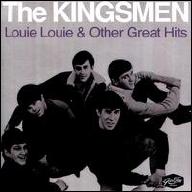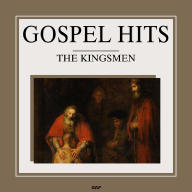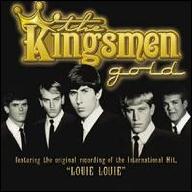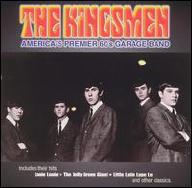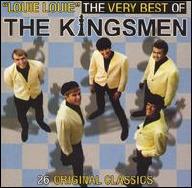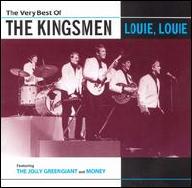The Kingsmen were formed in Portland, Oregon, in 1959 by guitarist and singer Jack Ely and drummer Lynn Easton, two teenagers who had been friends for years. The two began playing parties at a local yacht club, and within a year they'd expanded to a quartet with the addition of guitarist Mike Mitchell and bassist Bob Nordby. After playing every sort of job a teen band could land in the very early '60s -- from supermarket openings to school dances -- they landed a regular gig at a Portland teen club, where they developed a more high-spirited sound that reflected the rowdy tone of the Pacific Northwest rock scene of the day. The band's on-stage power was expanded when they added keyboard man Don Gallucci in 1962.
Meanwhile, Richard Berry's song "Louie, Louie," a minor hit in California upon its release in 1956, had become something of a staple in the Northwest; Rockin' Robin Roberts the Wailers had scored an impressive regional success with the tune in 1961, and soon nearly every major rock & roll act in the area had added it to their repertoire, including Paul Revere the Raiders and the Sonics. The Kingsmen's version of "Louie, Louie" became one of the most popular tunes in their set list, and their manager, Ken Chase, took the group into a small studio in Portland to cut a demo of the song. According to Jack Ely, the session was cut live with only three microphones, and he had to sing into a boom mike suspended from the ceiling. While the performance was a bit sloppy, and Ely's vocals were all but incomprehensible (not to mention that he came in early for the last verse and had to start over a few bars later), Chase paid the $36 for the session and called it done.
Jerry Dennon of the Seattle-based Jerden Records arranged to release "Louie, Louie" as a single, backed with the surf-inspired instrumental "Haunted Castle," and locally it ended up in a losing battle with Paul Revere the Raiders' version of the song, which racked up bigger sales and more airplay in the Northwest. But when the Kingsmen's version began getting radio play on a station in Boston, "Louie, Louie" began to break on the East Coast, and the New York-based Wand Records picked it up for nationwide release. In late 1963, "Louie, Louie" was a nationwide hit, rising to number two on the Billboard Top 40 chart, where it stayed for six weeks; the Singing Nun's "Dominique" prevented the song from hitting number one. Fittingly, while the Singing Nun sang in French and most Americans didn't know exactly what she was telling them, part of the appeal of "Louie, Louie" was that Ely's slurred delivery allowed teenagers to imagine all manner of obscene interpretations of Berry's lyrics. Rumors about the "real" lyrics grew so strong that the FBI even launched an investigation before admitting defeat and confessing they couldn't figure them out, either. (One of the more impressive cover versions of the song can be heard on the live album Metallic KO by Iggy the Stooges, with Iggy Pop bellowing a remarkably filthy translation with great relish.)
With "Louie, Louie" now a massive hit and the band's first album in stores, one would imagine things would be happy within the Kingsmen, but such was not the case. Ely and Easton were at odds, and after it was discovered that Easton had copyrighted the name the Kingsmen, Ely and Nordby left the band, and Gallucci soon followed suit. Easton assembled a new version of the group, with himself on lead vocals, Mitchell on guitar, Barry Curtis on keyboards, Norm Sundholm on bass, and Dick Peterson on drums. The new Kingsmen were popular on the touring circuit, appeared in the "Beach Party" film How to Stuff a Wild Bikini, and scored a pair of raucous follow-up hits, 1964's "Money" and 1965's "Jolly Green Giant" (a rewrite of Don Dewey's "Big Boy Pete"). Ely, meanwhile, assembled his own competing version of the Kingsmen, while Easton, unable to re-create Ely's distinctive vocal on "Louie, Louie," lip-synced to a recording of the hit on-stage. Eventually, the matter ended up in court; Ely was forbidden from using the name the Kingsmen, and Easton had to sing "Louie, Louie" on his own at their shows. Ely later performed with his groups the Squires and the Courtmen, and Don Gallucci went on to form Don the Goodtimes, later becoming a record producer who was behind the boards for the Stooges' epochal second album, Funhouse.
"Louie, Louie" managed to creep back into the charts in 1964 and 1965, and the band continued to tour and record, eventually releasing five albums, but as the harder sounds of the garage scene and the expanded perspectives of psychedelia changed the face of rock & roll, the Kingsmen's raucous, beer-fueled party tunes began to lose favor, and in 1968 the group quietly folded their tent. Easton and his bandmates authorized the group's management to send a new version of the Kingsmen on the road later that same year, but when management failed to pay Easton and his associates their share of the group's income, he pulled his authorization.
In the '70s, a new version of the Kingsmen began playing the oldies circuit, and when the movie Animal House re-introduced the song to a new generation of music fans, the Kingsmen were a going concern again. Longtime members Mike Mitchell and Dick Peterson were the core of the band, with vocalist Yank Barry, guitarist Dennis Mitchell, bassist Todd McPherson, and drummer Steve Peterson filling out the lineup. Jack Ely, who had made a return to music in 2011 with a Christian rock album, would sit in with the band on occasion to sing "Louie, Louie" in the time-honored fashion, until he died at his home in Terrebonne, Oregon on April 28, 2015. Guitarist Mike Mitchell died on April 16, 2021 as he was celebrating his 77th birthday. ~ Mark Deming, Rovi


